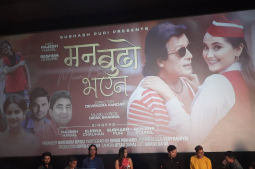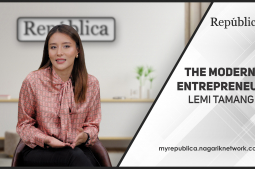CEO of Miss World Julia Morley talks about her COVID-19 speculation
4 years ago
_20200311200327_20200312135245.jpg)
4 years ago

4 years ago

4 years ago
Twenty-five years ago when Meena Dhungana gave birth to a baby boy, she had no idea about his intellectual disability. After his birth, she noticed his slow physical and mental growth. Then, she took him to the hospital; he was diagnosed with intellectual disability. “When I visited the hospital, I was told that my son had intellectual disability. But his actual condition was not diagnosed. I visited several hospitals and doctors. Then, finally he was diagnosed with autism,” Dhungana remembers.
Autism is also known as Autism Spectrum Disorder, generally diagnosed during childhood and its symptoms are visible before the child turns three. The condition is known as spectrum disorder because the severity of this condition varies from simple learning difficulties to severe difficulties and multiple abnormal behaviors. And, there are several types of autism — verbal (patient who can speak), non verbal (patient who cannot speak), high functioning, low functioning— among others.
According to Meena’s experience, parents have to face challenges while raising an autistic child. One of the challenges is to get a special school for them, along with that parents have to face major changes in their lifestyle. She explains, “One with autism is very punctual. Even without looking at a watch, they understand what time it is and what to do. If their routine is disturbed, it is kind of difficult to handle them.”
However, Meena has overcome her challenges so far and she was able to find a special school for her son. Today, she is the chairperson of Association for Welfare Intellectual Handicapped which runs the special school for mentally disable children.
Children with autism need special care system and disable friendly environment. Teaching methods are also different for children with autism. “Children with autism cannot learn as quickly as normal children. But once they are accustomed with the activities they are taught, they are able to do them on their own. We can teach them everyday things through therapies. Photo therapy, color therapy, dance therapy, and music therapy are some to mention. Moreover, any new environment can trigger their mental well being so we need to be extra careful.”
Speaking about disability friendly environment, Meena said that first step should be taken from parents themselves because they are the first person that a child has to deal with. “In some cases autism comes with other several unusual health conditions such as epilepsy, which may add difficulties in parenting. But guardians should accept their child the way they are and avoid any kind of discrimination.”
On this episode of ‘Here’s Why’ My City team talked to Meena Dhungana about her psycho-socio journey with autism and her experiences, which have helped her to cope with the situation and be strong in life.


- by Sangita Shrestha

- by Sangita Shrestha

- by Sangita Shrestha
Leave A Comment